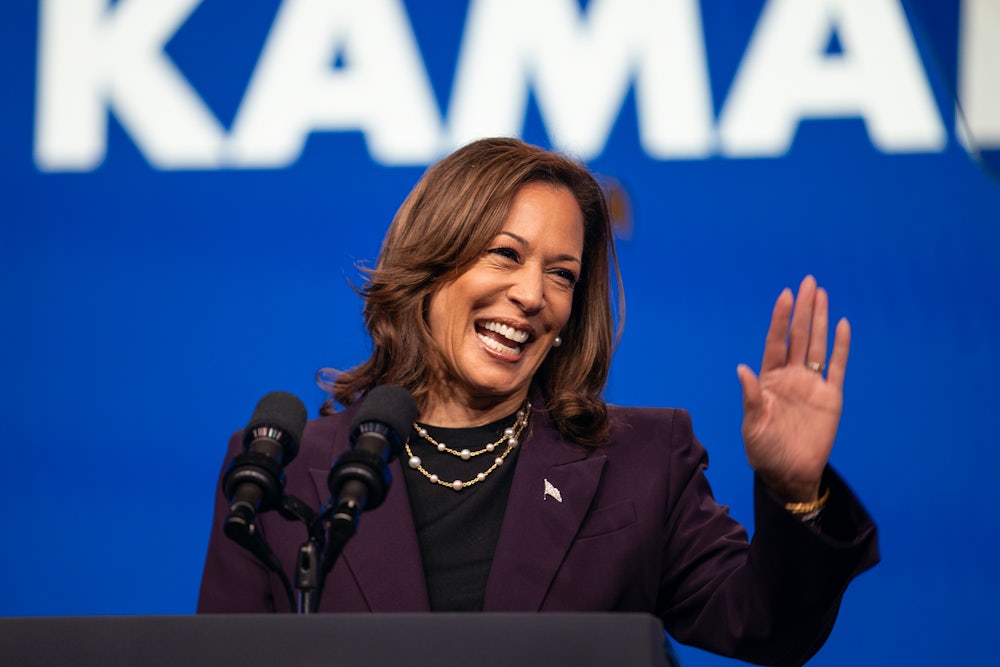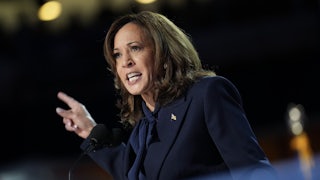On Thursday evening, in response to a question from CNN’s Dana Bash about her shifting—and at times amorphous—policy principles, Vice President Kamala Harris provided a simple defense: “My values have not changed.” She then spoke briefly about what she framed as minor but nuanced evolutions on the Green New Deal and border security, but her answer was a deft if transparent dodge.
Since Harris became the Democratic presidential nominee in mid-July, the fledgling Harris-Walz campaign has been dogged by both the right and the progressive left to define the specific agenda items they will prioritize should they win the presidency in November. That pressure will remain—and likely grow—as the election creeps closer. But the Harris campaign would be wise to ignore it. Their best strategy to win the election isn’t to push out white papers and hyper-detailed plans for policies; it’s to continue to make the vibes- and values-based argument that has been working for Harris for the last six weeks.
For a time, the vice president and her team ignored the pressure to provide policy specifics, opting instead to merely coast on the sudden, coconut-pilled consensus within the Democratic Party—even if no one could quite pinpoint what that consensus centered around beyond a general sense of exuberance. However, in mid-August their resolve broke.
During a speech in Raleigh, North Carolina, on August 16, Harris outlined how she would seek to address the high costs of housing, health care, and a host of other day-to-day expenses for average Americans. Her pitches included tax breaks for home builders with the aim of constructing three million new housing units in four years, down-payment aid for first-time homebuyers, an expanded child tax credit, an increase to the minimum wage, a ban on taxes on tips for hospitality workers, and a ban on price gouging in the food sector.
It was a sound if uncontroversial slate of economic policies. However, if both the Democratic National Convention and Thursday’s CNN interview serve as any indication, the Harris campaign now believes it was a misstep for a host of reasons.
The policy rollout did not go particularly well, largely because of one key proposal. While Democrats camped out on cable news to defend Harris’s economic platform, few dared to fully endorse her price-gouging crackdown. Delaware Senator Chris Coons and Michigan Governor Gretchen Whitmer both dodged the chance to defend it on Fox News Sunday and Meet the Press. Pushed on Republican criticism of the proposal by Fox News’s Shannon Bream, Coons played into his opponents’ hands, stating: “I know Kamala Harris believes in the free market … I don’t think there’s anything Communist about wanting to make housing more affordable and prescription drugs more affordable.”
Coons’s invocation of communism touched a third rail. No elected Democrat should be uttering the C-word at any point in this campaign, especially considering the Murdoch Cinematic Universe of Fox News, The Wall Street Journal, and The New York Post has been working tirelessly to paint Harris as the pinko love child of Joseph Stalin and Mao Zedong. (Relatedly, Elon Musk shared a bizarre A.I.-generated image of Harris wearing clothing emblazoned with a hammer and sickle over the weekend.)
To be fair, Harris’s price-gouging crackdown has critics outside of conservative media. Mainstream, left-leaning economists including Ernie Tedeshi and Jason Furman panned it as a price-control scheme, while Washington Post columnist Catherine Rampell wrote a piece with the subtitle: “It’s hard to exaggerate how bad Kamala Harris’ price-gouging proposal is.” The pile-on illustrated how there may be more peril than payoff in future policy rollouts—not only could they leave Harris surrogates potentially divided and on defense, but they will almost certainly give the GOP new angles to attack the vice president.
Next, to borrow the words of former Office of Management and Budget Director Bert Lance, “If it ain’t broke, don’t fix it.” The Harris team is currently ascendent. In just over a month she’s raised a whopping $540 million. The vice president is currently up by nearly two points nationally in the RCP average. Fox News swing-state polling from last week shows Harris up by one point in Arizona and two points in both Nevada and Georgia. What’s more, Republican efforts to tar and feather Tim Walz have utterly flopped. In a recent ABC News survey, 39 percent of those polled have a favorable impression of the Minnesota governor, while only 30 percent see him unfavorably. Trump’s running mate, J.D. Vance, meanwhile, is underwater at 32 percent–42 percent.
Harris’s vibes-based, personality-based approach to the first six weeks of this mad dash of a campaign is clearly working. And it’s working in part because of her reliance on broad, simple messages like “Protect a woman’s right to choose,” “Lower the cost of health care,” “Secure the border,” and “We’re not going back,” all of which seem to be enough for the American people. The campaign should take yes for an answer. There’s no indication that Harris needs to offer specific, potentially divisive policies on any issue—and all of the early signs suggest that doing so would be a mistake. Harris herself is not a wonk—she flopped in 2020 in part because she struggled to compete in a wonky, policy-heavy primary. And yet, even if she were a policy dork, there’s little reason to believe that it would necessarily boost her chances: In 2016, Hillary Clinton offered more than 200 distinct policy proposals and lost.
Additionally, Harris is unlikely to enjoy a Democratic trifecta, so major policy has less of a chance of being enacted than Bob Menendez has of being appointed the next ambassador to Egypt. The rising tide of Kamalamania has clearly lifted Democrats nationwide, but the prospect of holding onto the Senate and securing the House is still not strong. The Democrats’ best shot of holding onto power in either chamber isn’t by releasing a slew of domestic and foreign policy proposals—these will, moreover, most likely hurt them, particularly in competitive Senate races in states like Montana and Ohio. Instead, Harris can continue to push the argument that she is, unlike Donald Trump, someone who cares about ordinary people—and that her party is committed to “fairness” in its economic policy.
Last, Harris doesn’t need to run on policy because Trump never has. Sure, 2016 Trump presented a vague slate of action items. He vowed to renegotiate Nafta, to withdraw the United States from the Trans-Pacific Partnership, and he tapped Peter Navarro and Wilbur Ross to outline a brief, largely illiterate economic plan for his campaign website. Fast-forward to 2020, and the GOP opted not to release an official party platform. Now, in 2024, what is Trump even running on? He’s distanced himself from Project 2025’s 900+ page transition playbook but only after it became clear that most voters were repulsed by it. He’s mused about tariffs but offered few specifics. He can’t even articulate his thoughts on a federal ban on abortion or mifepristone or contraception more broadly. The campaign is rage, retribution, rank misogyny, “bird cemeteries,” and little else. Considering all this, why get lost in the details? If these last several weeks prove anything, it’s that the American people don’t care to watch Democrats play chess while Trump throws the checkers board against the wall.
Harris has been well served by ignoring policy; her selection of Walz as her running mate suggests that she values keeping the party going and that she knows she can win by pitting joy against anger and hope against hate. If she offers a few popular campaign promises (like an expanded child tax credit) but otherwise stays out of the weeds, she can soar toward November. Harris should hang out in the coconut tree and not release any economic plans that can’t fit within a Venn diagram. To win, Harris doesn’t need policy. She just needs vibes.




